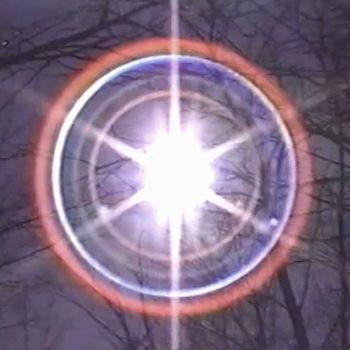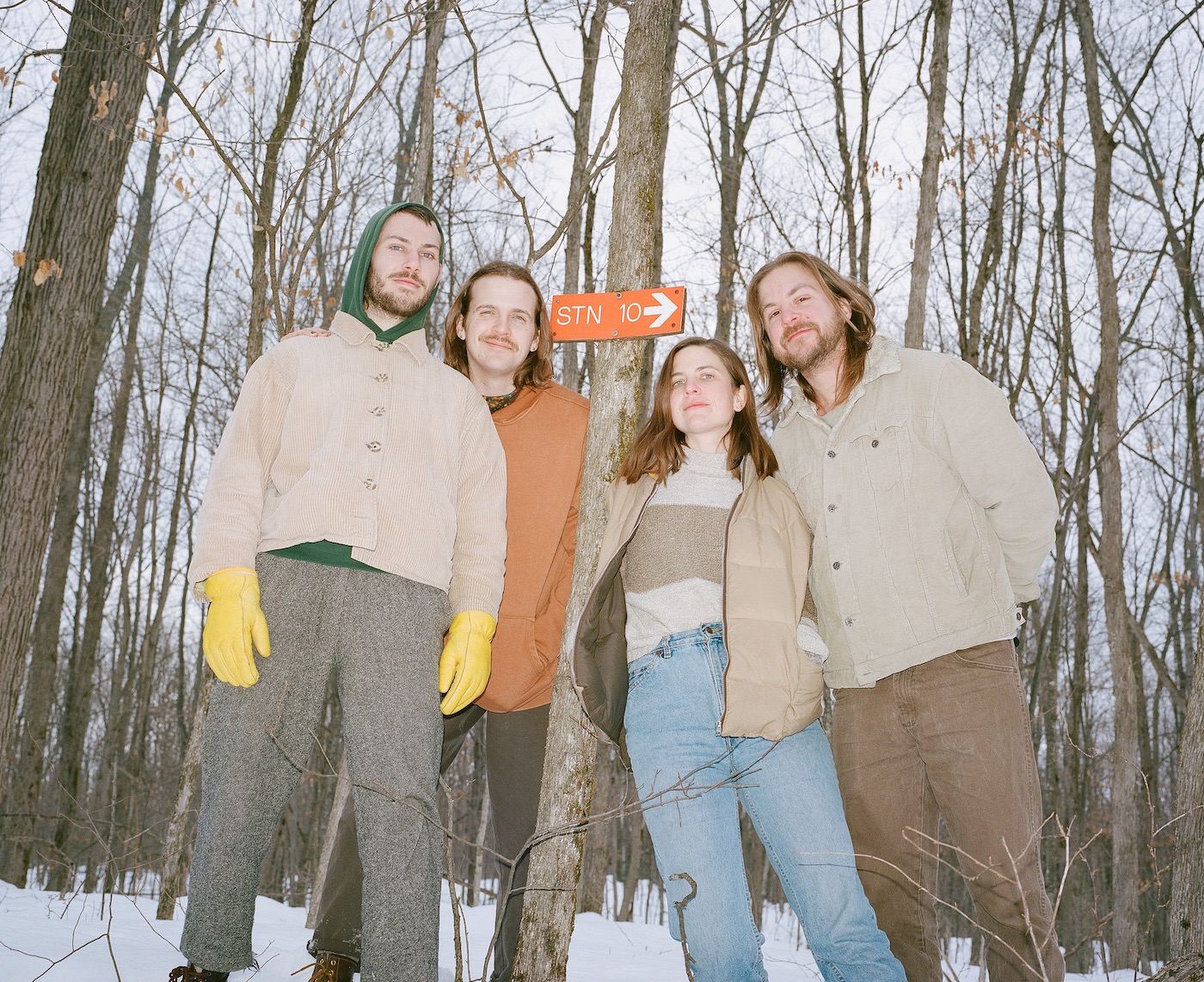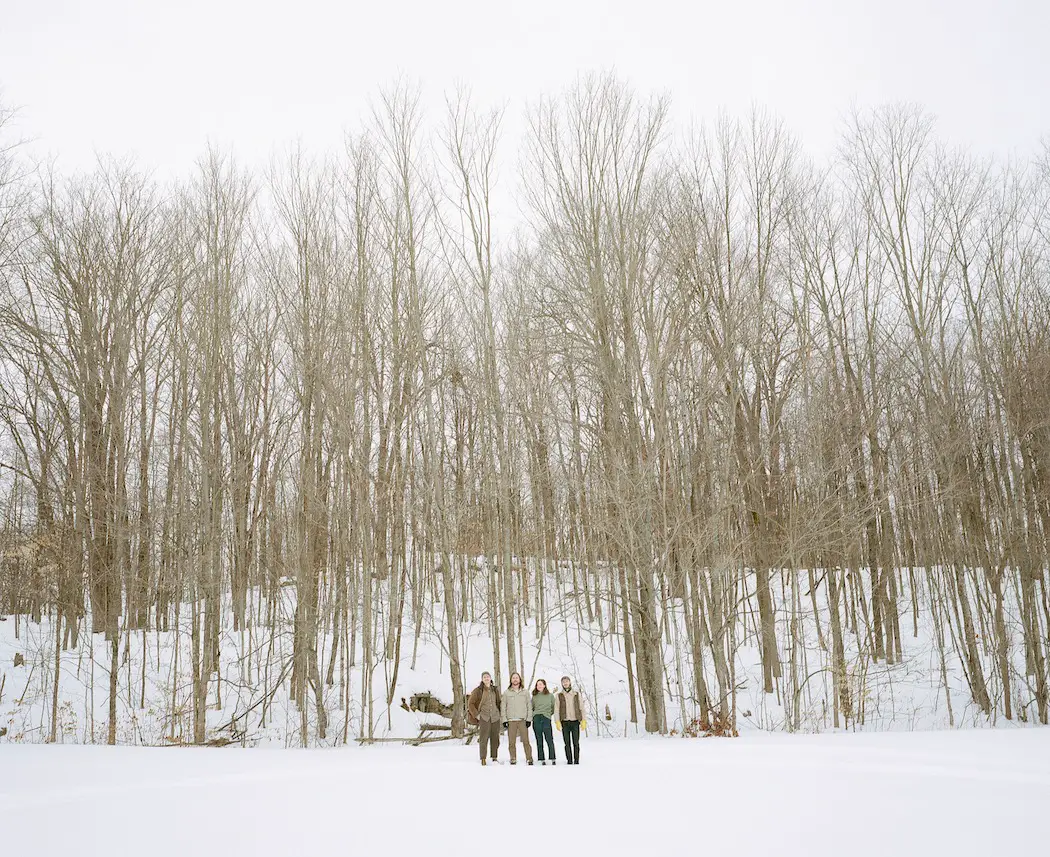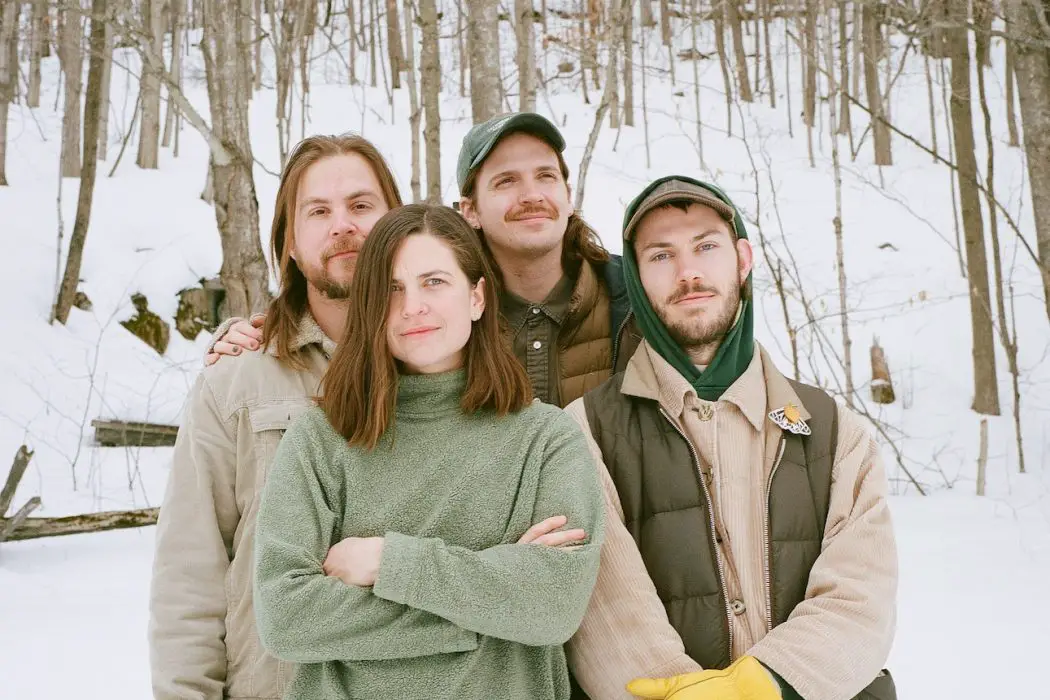Little Kid dive into their special sixth album ‘Transfiguration Highway,’ a moving journey through self-discovery & spiritual awakening that radiates light, depth, and understanding.
for fans of Wilco, Lucero, Big Thief
Stream: “Losing” – Little Kid
Little Kid are the kind of band I wish I had discovered a decade ago, somewhere in my late teens.
Their DIY aesthetic and raw, indie rock and alternative folk sounds are as soothing to the nerves as they are fulfilling to the soul: An immersion of intimate songwriting and organic instrumentation that radiates light, depth, and understanding.
Yes, we’re a little late to the game – but what better time, than during this global pandemic’s lockdown state, is there to discover a new favorite band? With over six studio albums’ worth of material released over the past ten years, Toronto’s Little Kid are the needle in the haystack – a hidden gem we didn’t know we needed, until now. The band’s recently-released sixth album Transfiguration Highway takes listeners on a moving journey through self-discovery and spiritual awakening. Philosophy and religion, existential wanderings and vulnerable upheavals coalesce to make Transfiguration Highway a powerful record not just for the present, but for all of life’s moments where we need to take one step back in order to go two steps forward.

When you got back
You went down to that track
To watch the dogs
You’d saved some cash
For first and last
But you were trashed & you were stoned
Casually picked
A random dog from the list
Said “That’s the one”
But at the sound of that gun
Already knew in your gut
You’d lost it all
It really is amazing
I don’t know how you do it
Never much for playing but
You’ve always had a way
With losing
– “Losing,” Little Kid
Released July 3rd, 2020 via Solitaire Recording (Kate Davis, Common Holly) Transfiguration Highway is a sweeping arc of sonic nuance, provocative thought, and emotional weight. It’s the most accessible recording yet from Little Kid, a five-piece Canadian band led by Kenny Boothby, Megan Lunn (banjo, keys, vocals), Paul Vroom (bass & vocals), Liam Cole (drums) and Brodie Germain (drums, guitar, percussion).

“The title comes from a song on the album,” singer and songwriter Kenny Boothby explains. “The first verse of that song talks about a transfiguration in a small town and the other verse talks about a highway. When I named the song I just stuck those two words together and liked the sound of it. Once we decided the title suited the album as well, it sort of took on some new meanings for me – mostly I picture it as a fictional highway linking the different towns and cities I’ve lived in, and the different versions of myself who have lived in those places.”
Boothby’s lyrics are themselves little works of art deserving of their own scrutiny, but it’s how his lines are delivered (and what they’re delivered with) that helps Little Kid’s music shine with a light all its own. A record that takes time to breathe and settle, Transfiguration Highway gives its audience room for thought and self-reflection. It’s a safe space to dwell in our heads – to dive into those depths we tend to save for the middle of the night, when we’re restless and can’t fall asleep.
“I think everyone will hear it a little differently, so I don’t have any particular expectations or goals [of this album],” Boothby tells Atwood Magazine, “… but I hope that it’s the type of album that will reward repeated listens as people notice little sonic details and playful harmonic stuff we had fun sneaking in. I hope folks can also at least find a few moments of peace or catharsis in it.”
Patience, paying off
You pushed your luck
For so long you finally won
Famous, for killing time
And telling lies
You made it sound so goddamn nice
But I’m not implying I wouldn’t like it
If someone decided to pay me some mind
Nothing young
Underneath that sun
Won’t take it personal
You weren’t the first one
To ask
– “Thief on the Cross,” Little Kid

Little Kid have also reached new peaks from a sheer musical perspective, blending dirty and clean sonics, electric and acoustic guitars, harmonicas, layered vocal harmonies, and more to much applause. Recorded to tape, their record beams with a natural warmth we seldom hear nowadays.
“I think the recording process further cemented our love for recording live as a band,” Boothby shares. “The last few records have emphasized that approach, but this one took it to another level because were recording on tape for the first time and we couldn’t afford enough reels to record multiple tapes – we really had to focus on playing well together and trusting our instincts to know if the take was right or if we needed to try again. On the note of recording to tape, I think it also reminded me how much our music benefits from that warmth. The first Little Kid album was recorded on a Tascam four track, and we’ve often worked in little cassette recordings or treated certain tracks with tape since then, but it was very satisfying to record an album with a lot more analog elements, and I think the sound of this record is the closest to perfect we’ve been able to achieve yet (all credit goes to Paul Vroom, our bassist who also engineered, mixed, and mastered the record).”
He continues, “I think the band has grown in confidence as players and collaborators – I’d like to hope everyone in the band came away from it with a feeling that what they contribute to the band is crucial and beautiful… I definitely value everyone’s unique contributions to this album perhaps more than any other. It’s one of our most collaborative albums and I feel like our connection as a band is stronger than ever. For me personally, I think I’ve learned that I can let my sense of humour into the songs a little bit more, and they’ll often be stronger for it. And both musically and lyrically, I think we’ve all come to trust our instincts more than ever.”

If it sounds like Transfiguration Highway is a special and important milestone for Little Kid, that’s because it is – and we’re glad to have discovered this band when we did.
From the feverish harmonica at its start (who opens an LP with harmonica these days?! Little Kid, that’s who!), to the dazzling breaths scattered throughout “Made for Each Other,” to the echoing pianos of “Gill,” and the warbly oomph and light laughter in “Pry,” Transfiguration Highway is full of secrets waiting to be found. Experience the full record via our below stream, and peek inside Little Kid’s Transfiguration Highway with Atwood Magazine as Kenny Boothby goes track-by-track through the music and lyrics of the band’s sixth album!
— —
:: stream/purchase Transfiguration Highway here ::
Stream: ‘Transfiguration Highway’ – Little Kid
:: Inside Transfiguration Highway ::

— —
I Thought That You’d Been Raptured
This song is one of the most purely fictional songs I’ve written. It’s essentially all built around a joke I came up with where a man comes home early from work and finds his wife’s clothes around the house, but his first thought is that she has been raptured and he has been left behind. Of course, it turns out she is sleeping with someone else in the bedroom upstairs…
Musically, it’s obviously borrowing heavily from some wild-mercury-era Bob Dylan, with some stranger chord progressions than he usually uses, perhaps. On the day I wrote it (all in one sitting), I had built it all around a very basic chord progression A E A E A E B, which I played throughout the entire song (now that progression is just in the chorus). As I sat down to start recording the demo, I thought “this is all wrong – where are the fucky chords?” So I “did some math,” as I like to say, and changed most of the chords through the verses but kept the melody the same… I was looking for unexpected harmonies, trying to get away with some wacky stuff while still keeping the more traditional Dylan-esque vibe to the song.
This one was definitely the hardest to record. Meg, Paul, Liam, and I tracked it live at the Pharmacy, and it was the first day we had all played the song together. I think we were getting in our own heads or something because we kept feeling unsatisfied with our takes and wanting to retry. Since we were recording on tape, we had to decide right away whether we were happy with the take, and if not, we would record over it. It honestly felt like we did 10-15 takes for this one… I think we were still not even feeling 100% on it, but when we listened back later it felt great – so who knows how many of those takes would have been just as good if we hadn’t been overthinking it…
Musically and lyrically, this is one of the songs I’m most proud of… I’m especially happy to have found a way to showcase my stupid sense of humour a little more obviously than usual.
What’s in a Name
Musically, this song is based around a very repetitive piano part – the demo was actually just a few layers of piano and vocals. We originally added a lot of layers, including a prominent bass part and three drum tracks, but ended up shaving it down to just a few elements for the final mix. The final version is not too different from the demo, aside from some added percussion, and some beautiful background vocals from Megan. I sent Paul the song “Peach, Plum, Pear” by Joanna Newsom as a reference – I wanted it to be scrappy and minimal like that song (a masterpiece, in my opinion), although I guess our song probably ended up less scrappy than hers.
The lyrics in the chorus were just something I started singing when I recorded the original voice memo to my phone (Feb 18th, 2018) – obviously it’s a common figure of speech but I guess it can be traced back to Shakespeare’s Romeo and Juliet. I built the rest of the lyrics around that line, thinking in particular about some friends of mine who have changed their names (some as part of their transition, others just because they didn’t feel comfortable with the one their parents gave them). Although I’m content with the name I’ve been given, the personal layer to this song would be my own experience with gender identity, and the second verse focuses on those experiences and on gendered expectations in general. “What’s in a name?” could be “what’s in a word?” or “what’s in a label?” or “what’s in a pronoun?” the way I’m meaning it, I guess.
Transfiguration Highway
The guitar, bass, and drums for this song were recorded live by Brodie, Paul, and I, after creating the song structure together that day based on a voice memo I had recorded around that time. As with the rest of the album, we were recording on tape, so if we weren’t satisfied with a take, we would have to record over it – I feel like we only did 1-2 takes and felt pretty good about this one. I added the second acoustic guitar layer right away and then spent some weeks with the rough mix to write some lyrics around it. After I added my vocals, Megan came into the studio having never heard the song before, and came up with her harmonies / counter-melodies on the fly. What she does on the final chorus made the song 100x better than it was… Paul and I filled the song out by adding some layers of SK-1 samples and a few tracks of piano trills that I recorded at varying speeds on my 4-track. Brodie had moved back to the UK by then, and we asked him to add some slide guitar for some needed twang – what he added to the chorus was totally disorienting at first but we all grew to love it, and it seems to be what most people first notice and remember about the song.
The lyrics were inspired by a trip I took with my partner to my hometown of Petrolia, Ontario in early 2019. We have some shared history there since her dad spent some time living there as a child. It was the first time we visited together, and the first time I had been there in several years. Importantly, it was the first time I had been there since I started going to therapy last year, and I had been processing some pretty heavy stuff from my childhood… Previously, seeing my house from that time would fill me with a pleasant nostalgic feeling, but this time I felt sick to my stomach and wanted to get out of there…
A couple days later, I was telling my friend about the experience, and we ended up showing each other our hometowns and childhood homes on Google Maps. Sadly, when we tried to find my friend’s house in Windsor, Ontario, we found that the whole block had been cleared for a highway… So that’s where the line “we tried to find your house / but it’s a highway now” came from. The rest was more based around my feelings of returning to my hometown and reflecting on the changes in the town, as well as the changes in myself, since I moved away.
Thief on the Cross
Most of the instrumental tracks for this song were recorded live: Paul on bass, Megan on banjo, Kenny on Yamaha CP-70 (run through a Blues Jr amp with everything cranked to 10), and Liam on drums. As with a lot of these songs at the start of the recording process, I didn’t have lyrics written yet, so I sang nonsense through the microphone to keep us on track with the structure of the song. We had only played the song a handful of times and we kept one of the first takes, so it’s definitely an unpolished performance – we all felt a little self-conscious about it but it’s become one of our favourites.
Lyrically, the song is about certain bands finding success while others don’t – feelings of jealousy that might sprout from that, some perceived obligations for more successful bands to help out the newer ones, the awkwardness that can come from shifts in those power dynamics… But it’s definitely very tongue in cheek.
The title is related to some lines in the second verse: “praying you’ll remember me / when you finally reach / the entrance to eternity / I played in that old three piece / we opened for thee / way back in 2015.” According to the Bible, Jesus was crucified between two thieves. One of the thieves basically says “if you’re really the son of God, you’ll just climb down from the cross right now and save yourself,” but the other one calls him out and says, essentially, “we both deserve to die for our crimes, but Jesus has done nothing wrong.” And then he asks Jesus to remember him when he reaches heaven, and Jesus assures him that he’ll be with him Paradise. So this line is kind of poking fun at myself a bit, kinda praying some bands we have played with will somehow take us along with them as they gain more success and exposure than we have seen, etc. More info: https://en.wikipedia.org/wiki/Penitent_thief
All Night (Golden Ring)
This song is about the relationship between Tammy Wynette and George Jones, two country singers who were famous for their duets. I bought a used copy of an album of theirs called Golden Ring at a record store a couple years back, not knowing much about it. It’s a pleasant enough album to throw on, with some great singing from both of them, and some great songwriting from Bobby Braddock and others, but there’s a dark undercurrent to it if you read a bit about the history…
George and Tammy were married for several years and released several collaborative albums during that time, but they divorced in 1975. George was an alcoholic and Tammy alleged that he beat her and once fired a shotgun at her. They both tried to pursue solo careers but neither of them had near as much success as they used to as a duo. So the decision to record the songs on Golden Ring, and tour together once again, was purely a commercial one – and it was their first LP to reach number 1 on the charts. More info: https://en.wikipedia.org/wiki/Golden_Ring_(album)
I was really saddened to read about that, and to picture how that must have felt for Tammy… I can’t relate directly, but as a survivor of abuse, I can only imagine what it would feel like to have to sing with my abuser, much less to have to sing love songs with him and act like everything is OK.
The music was written on the piano, and I was always picturing a melody that sort of overlapped this way – when I realized it would work well as a duet, and made the connection to Tammy and George’s story, the song was easy to write, with myself playing the part of an unrepentant or oblivious George, and Meg playing the part of Tammy, sort of doomed to perform for an eternal audience. I realized afterwards it can also work more generally as a meditation on people trapped in an abusive, or simply loveless, relationship, with the “show” being the performance of pretending you’re happy in front of friends and family.
The recording for this song was interesting… We tracked guitar, bass, and drums live, playing in the key of A. We realized we had played it much too fast, so we tried out an idea we had been toying with for a while, and slowed the tape down to make the song a full tone lower. We overdubbed the rest of the tracks in the key of G. So there’s an interesting mix of sounds in there, and it gives the song a very dirgey feel.
Candle Out
This is a pretty simple song, built around a piano part I recorded as a voice memo on the same day as “What’s In a Name.” The lyrics are mostly just imagery inspired by my memories of my house in Oil City, Ontario, where I lived while I went to high school. That house burned down in 2012 when I was living in another city for university.
Made for Each Other
This was probably the most off-the-cuff song on the album. I came to the Pharmacy with the two guitar parts for the verse and chorus, and I just sat in the booth and played the classical guitar through each part for however long felt right. Then, I added another two more layers of improvised guitar picking. Liam sat down and played two drum takes, and Paul came up with a bass line, and the song was already feeling fairly complete.
I wrote the lyrics on the subway on the day I told Paul I would come down and record some vocals. After that, Paul sent a mixdown to the band, but included an alternate version with the whole song dropped down a full tone, including my vocals, so my voice was very deep and slow. Paul recommended we ask Meg to sing instead, and she came in and nailed it, making some little changes to the melody that made the song her own. The low Kenny voice joins her at the end of the song. After that, we tracked a few layers of piano at my house and Paul created the unsettling SK-1 loop at the end by sampling Megan’s voice.
Close Enough to Kill
This song was based on one of the oldest voice memos on my phone (from October 24th, 2013). The verse and chorus chords and melody were already mostly there, but the band helped me develop it into a full song, and we tracked it with me singing nonsense that would be replaced with real lyrics later.
It was one of the last songs I finished, lyrically – for some reason I had a very hard time writing around this melody. The first verse is about drawing near to a god in the hopes that they will kill you at a time when you are closest to them, and therefore welcome into heaven. The second verse is mostly about good sex – but more generally, about the vulnerability that comes with letting someone get close to you, physically or emotionally.
Losing
This is another song that is mostly or entirely fictional. I was enjoying playing with some country tropes – the down-on-their-luck gambler, the man wallowing in regret about leaving the lover he now realizes was perfect for him, etc. I’m not sure where the chorus came from, but it felt right. In the first verse, the narrator’s friend loses their savings on a drunken bet at a dog race. In the second verse, the narrator crosses paths with their ex lover who they still harbour feelings for and expresses their regret about losing her.
The song was written on the piano – it was one of the memos on my phone that I was most excited about. It came together when I played it on guitar with Paul on bass and Brodie on drums – we felt like it took on a personality not far from some favourite “Canadiana” artists like The Band, The Tragically Hip, or Neil Young. Brodie recorded his slide guitar parts in London, England and sent them to Paul.
Gill
I recorded a voice memo of this chord progression on the day of my friend Gill’s funeral. We weren’t very close, but she was a person with a pure heart – a charming weirdo who loved music and was always great to talk to. She sang on the song “Missionary” from our album Flowers, and performed that song and a few others with us for that album’s release show. I wanted to honour her somehow, but I couldn’t seem to find the words… When I listened back to the voice memo some time later I realized it could work as an instrumental – it seemed to capture the feelings I have about Gill’s death, even without words. I recorded this version on my four track at home.
Pry
Musically, this is probably the simplest song on the album – it’s almost entirely built around two chords. Between that and the steady-strummed classical guitar, this one feels a bit like a throwback to some earlier Little Kid sounds. But the melody was very satisfying to me, so I wanted to try to develop it into something with the band. When the chords finally change at the end, it feels right.
We recorded two vocal tracks at different tape speeds and panned them across the left and right channels. Liam recorded two drum tracks that we panned left and right as well, Megan added some perfect vocal harmonies, and Brodie sealed it with a beautiful 12-string Danelectro part. To me, his part makes the song feel a bit like an Aimee Mann song.
Lyrically, the song describes the feeling of coming across a kind of love you hadn’t yet experienced and perhaps didn’t believe was possible. There’s a sense of security and calmness to the love in this song that is a far cry from the concerned husband in track 1, for example. It’s probably the most straight-up love song we’ve included on an album yet and it felt perfect as a closing track.
— —
:: stream/purchase Transfiguration Highway here ::
— — — —

Connect to Little Kid on
Facebook, Twitter, Instagram
Discover new music on Atwood Magazine
? © Will Cox
Transfiguration Highway
an album by Little Kid








